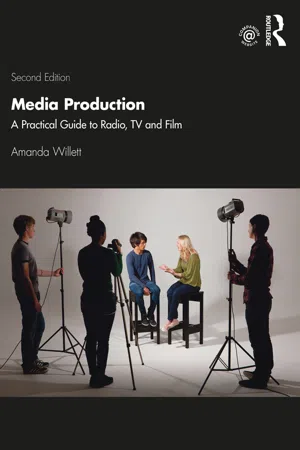
- 270 pages
- English
- ePUB (mobile friendly)
- Available on iOS & Android
About this book
Fully revised and updated, this second edition of Media Production provides a comprehensive introductory guide to radio, television and fi lm production techniques.
Using a step-by-step structure that takes students through the production process from conception to delivery, this book explores initial brainstorming through to planning, research, recording and editing. Operational procedures are set out in detail, taking into account the context in which students work and the type of equipment available to them. Clear instructional photographs are provided to illustrate key teaching points.
Written by an experienced BBC producer and director, this textbook is ideal for FE Media students as well as those just starting out in the industry.
Updated online resources include templates, notes and exercises to help students prepare for their own productions, as well as a glossary of key terms and helpful weblinks.
Frequently asked questions
- Essential is ideal for learners and professionals who enjoy exploring a wide range of subjects. Access the Essential Library with 800,000+ trusted titles and best-sellers across business, personal growth, and the humanities. Includes unlimited reading time and Standard Read Aloud voice.
- Complete: Perfect for advanced learners and researchers needing full, unrestricted access. Unlock 1.4M+ books across hundreds of subjects, including academic and specialized titles. The Complete Plan also includes advanced features like Premium Read Aloud and Research Assistant.
Please note we cannot support devices running on iOS 13 and Android 7 or earlier. Learn more about using the app.
Information
Part I
Pre-production: preparation and planning
1How to use this book
Where to start?
Table of contents
- Cover
- Half Title
- Title Page
- Copyright Page
- Dedication
- Contents
- List of templates
- List of exercises
- List of figures
- Preface
- Acknowledgements
- Part I Pre-production: preparation and planning
- Part II Production: recording and shooting
- Part III Post-production: editing and feedback
- Glossary
- Further information
- Index